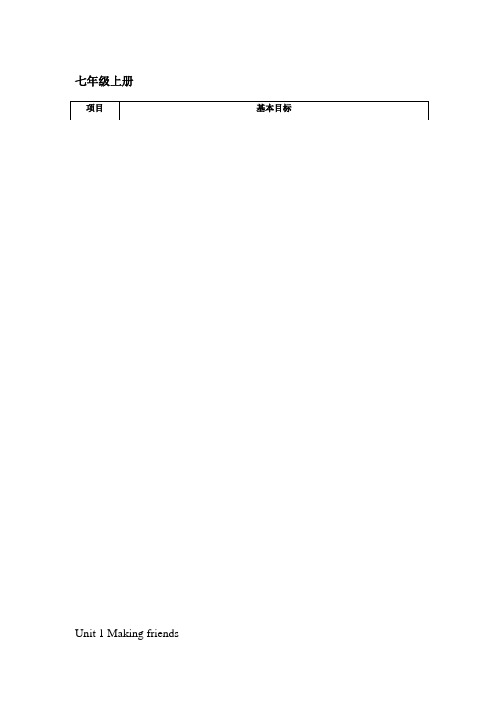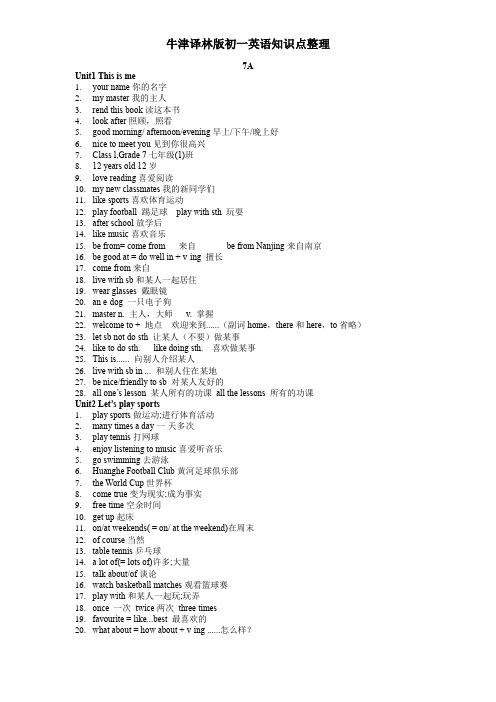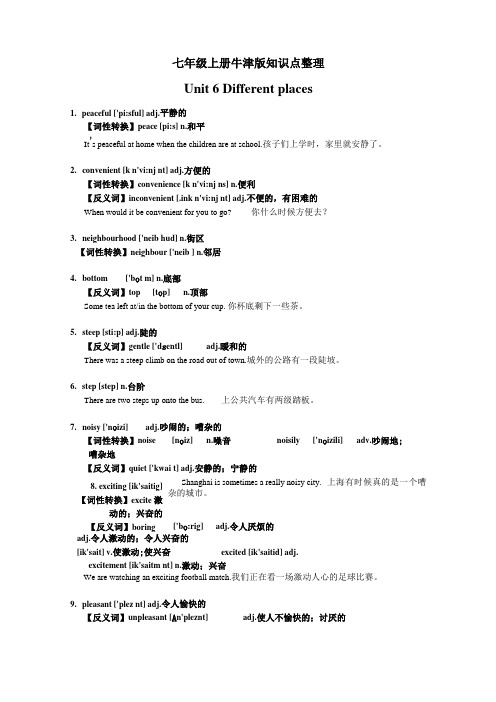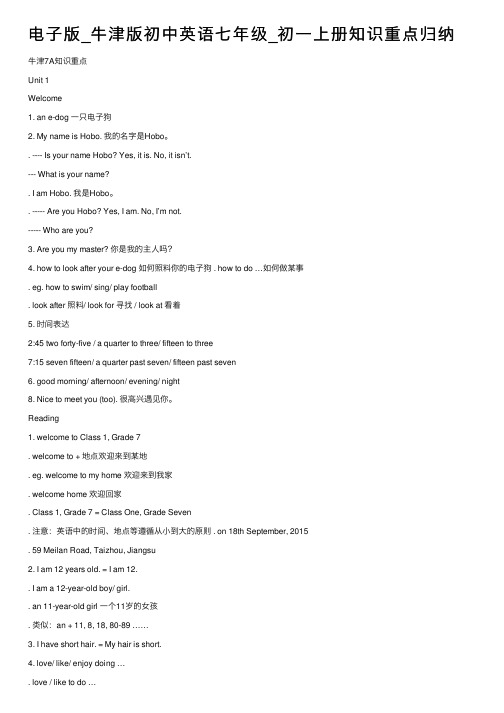七年级英语上册 全一册知识点梳理 牛津版28
牛津英语七年级上册期末复习知识点整理

牛津英语七年级上册期末复习知识点整理译林版牛津英语七年级上册期末复知识点整理Units1--4重点知识点总结n.名词v.动词vt.及物动词vi.不及物动词adj.形容词adv.副词prep.介词pron.代词conj.连词1、喜欢like / love / enjoy / be XXX (痴迷于)/ have fun / have a good time +doing sth.动词+doing的还有Go XXX good at doing sth./ do well in doing sth.XXX.2、“四大看”read vt.看读物(XXX等)look vi.瞧常用短语look at/ for/around/after/out/over/upsee vt.瞥见,夸大成效I can see you.watch vt.带有观赏性的寓目watch TV/ a film / a football game3、“五大穿着”Put on强调“穿上”的动作XXX ____XXX.Wear强调“穿着”的状态;进行时态表示暂时的情况XXX glassesDress(1)dress sb.(2) dress oneself(3) dress up as(4) get dressedIn(穿戴)后接颜色(或衣服),表示状态look!XXX is_____a XXX后接人指衣服穿在某人身上看出区别来。
The red coat looks nice on you.4、“四大花费”XXX:sb.(人)+ XXX.sb.(人)+ spend +工夫/款项+(in) XXX.pay:sb.(人)+pay +款项+for sth.cost:sth.(物)+ cost + sb.+金钱XXX时间XXX:it XXX sb. +时间+ to do sth.5、“三大地点副词”Home / there /here前不加任何的介词welcome home / come here / go there6、“三大使役动词”Make sb. do sth./ have sb. do sth. / let sb.do sth.7、晤面打号召用语(1)Nice to meet you . (2) Glad to meet you . (3) How are you ? (4) How are you doing ?(5)How is it going ?(6)How is everything going?(7) What’s up?8、基数词+year(s)+old透露表现“…岁”发问用“how old”名词性短语数词-year-old也透露表现年岁,但其为描述词性短语“前有冠词后著名(词)”Eg. Helen is 11 years old = Helen is an 11-year-old girl.9、Let’s与let us的区分Let’s do sth.指包括听者(对方)和说者(我们)都在内,表示建议Let us do XXX.指“让(允许)我们做某事”而听者(对方)不做,只有“我们”做10、play+the+乐器类名词e.g. Play the pianoPlay +球类活动play+ football / play cards / play chess11、She comes from Shanghai= She is from Shanghai .注:如何提问Shanghai及如何改一般疑问句12、be good at =do well in = be clever at = study sth. wellBe good at (反) be bad atdo well in (反) be poor in13、介词over的用法(1)”在…正上方” There is a bridge over the river.(2)”超出”A plane flies over the house(3)”跨越” There are over 20 boys in this class.(4)”竣事” Class is over! / Game is over.14、every one与everyone辨析区分(1)Every one能够与of连用,而everyone却不克不及与of连用Eg.every one of the children XXX.(2) XXX只指人=everybody而every one既指人又可指物配合点:谓语动词都要用“三单”15、family的用法:“家庭”作为团体谓语动词用“单数”He has a big family.“家人”夸大成员,是复数寄义,谓语动词用“真相” My family are at home.拓展:个人名词有people、class、police、sheep、deer、furniture等16、all/ both/ each/every/neither/ either的用法all(1)三者或三者以上“全部、都”(2)all + the +名词(all the afternoon = the whole afternoon)(3)all放在行为动词前,名词前;be动词后(4) all of +宾格/名词复数Both(1)二者都(2)后可跟of +宾格/名词复数Both sides of XXX指两个或两个以上“每个”个别Each side of the XXX.Every指良多人或事物的“部分”后接名词单数Every student is here .一切人都在。
七年级英语上册知识点牛津

七年级英语上册知识点牛津作为初中英语的开端,七年级英语上册的知识点牛津十分重要。
在这里,我们将对牛津七年级英语上册中的重要知识点进行梳理和整理,帮助同学们更好地学习和提高英语水平。
一、基本语法1. 一般现在时:表示现在正在进行或习惯性的动作。
例如:I usually get up at six in the morning.(我通常早上六点起床。
)2. 现在进行时:表示现在正在进行的动作。
例如:She is reading a book.(她正在看书。
)3. 一般过去时:表示已经完成的动作。
例如:I watched a movie yesterday.(我昨天看了一部电影。
)4. 现在完成时:表示已经完成的动作对现在造成的影响。
例如:I have finished my homework.(我已经完成了我的作业。
)5. 现在完成进行时:表示从过去某时开始一直到现在正在进行的动作。
例如:I have been studying English for two hours.(我已经学了两个小时的英语。
)二、基本词汇1. 数字:one, two, three, four, five, six, seven, eight, nine, ten2. 人称代词和物主代词:I, you, he, she, it, we, they, me, you, him, her, it, us, them3. 颜色:red, blue, green, yellow, black, white4. 学科:math, science, history, geography, music, art, PE三、基本句型1. 陈述句:主语 + 谓语 + 宾语例如:I love English.(我爱英语。
)2. 疑问句:疑问词 + 动词 + 主语 + 其他信息例如:What is your name?(你叫什么名字?)3. 否定句:主语 + 动词 + not + 宾语例如:I do not like math.(我不喜欢数学。
牛津译林版英语七年级上册各单元重点总结

牛津译林版英语七年级上册各单元重点总结Unit 1: Greetings and Introductions- Key phrases: Hello, Hi, Goodbye, Nice to meet you, What's your name?, My name is...- Basic conversation skills: Greeting people, introducing oneself and others- Vocabulary: Greetings, names of people and countriesUnit 2: Classroom Language- Basic classroom instructions: polite ways to ask for permission, give instructions, and perform actions- Vocabulary: Classroom objects, actions, and instructionsUnit 3: Numbers and Colors- Key phrases: How old are you?, What's your favorite color?, It's red.- Basic conversation skills: Asking about age, talking about favorite colors, describing colors- Vocabulary: Numbers, colors, ageUnit 4: My Family- Key phrases: How many people are there in your family?, This is my mother/father/sister/brother.- Basic conversation skills: Talking about family members, describing family relationships- Vocabulary: Family members, possessive pronounsUnit 5: My School- Key phrases: What's your favorite subject?, Do you like...?, Yes, I do. / No, I don't.- Basic conversation skills: Talking about school subjects, expressing likes and dislikes- Vocabulary: School subjects, opinionsUnit 6: My Friends- Key phrases: Who's your best friend?, What does he/she look like?, He/She is...- Basic conversation skills: Talking about friends, describing appearance- Vocabulary: Words to describe people's physical appearanceUnit 7: Free Time Activities- Key phrases: What do you do in your free time?, I like playing football / reading books / listening to music.- Basic conversation skills: Talking about hobbies and free time activities- Vocabulary: Hobbies and leisure activitiesUnit 8: Daily Routines- Key phrases: What time do you get up/go to bed/eat breakfast?, I get up at.../Go to bed at.../Eat breakfast at...- Basic conversation skills: Talking about daily routines and telling the time- Vocabulary: Daily activities, timeUnit 9: Food and Drinks- Key phrases: Do you like...?, Yes, I do. / No, I don't., Can I have some...?, Sure, here you are.- Basic conversation skills: Talking about food preferences, ordering food and drinks- Vocabulary: Food and drinks, likes and dislikesUnit 10: Clothes- Key phrases: What are you wearing?, I'm wearing a T-shirt/trousers/skirt/shoes, etc.- Basic conversation skills: Talking about clothes and describing what someone is wearing- Vocabulary: Clothing itemsUnit 11: Weather- Key phrases: What's the weather like today?, It'ssunny/rainy/cloudy/windy, etc.- Basic conversation skills: Talking about the weather and describing weather conditions- Vocabulary: Weather words and phrasesUnit 12: Holidays and Celebrations- Key phrases: When is...?, It's on..., What do people do on...?, People usually...- Basic conversation skills: Talking about holidays and celebrations, discussing traditions and customs- Vocabulary: Holidays and celebrations, activities以上是牛津译林版英语七年级上册各单元的重点总结,希望对您有所帮助。
广州牛津版七年级上册知识点总结

七年级上册项目基本目标Unit 1 Making friends词汇1 title n. 题目,标题2 greeting n. 问候3 dear adj. 亲爱的4 address n. 地址5 street n. 街道6 magazine n. 杂志7 hobby n. 业余爱好8 chess n. 国际象棋9 restaurant n. 餐馆10 as prep. 作为11 badminton n. 羽毛球12 tennis n. 网球13 engineer n. 工程师14 middle n. 中间15 age n. 年龄16 left n. 右边17 stand v. 站立18 around prep. 周围;围绕19 complete v. 填写(表格);完成20 information n. 信息;资料21 grade n. 年级;成绩等级22 primary adj. 小学教育的23 captain n. 队长;组长;船长24 reply n. 回答25 choose v. 选择26 future n. 未来;将来27 difficult adj. 困难的28 handwriting n. 笔迹29 small adj. 小的30 sky n. 天;天空词组work as; be keen on; at school; in the middle; best wishes; in glasses; on the right; on the left; one of the best; in the world; next to; be friendly to; in the future; be kind to; do exercise; last for; at the beginning of; at the end of; go swimming; go to the sea; go skiing句型1.I would like to...2.How many people are there in your family?3.What do they do?4.Here are some things about...Unit 2 Our daily life项目基本目标 词汇 1life n. 生活;生命 2probably adv. 很可能;大概 3most adj.(数量上)最多;最大 4find v. 找到;发现 5daily adj. 每日的;日常的 6top adj.(位置、级别或程度)最高的 7business n. 公司;生意 8still adv. 还是;仍然;依旧 9wash v. 洗;洗脸(或手等);洗澡 10uniform n. 制服;校服 11discuss v. 讨论 12make v. 做;使得 13twice adv. 两次 14club n. 俱乐部;社团 15once adv. 一次 16continue v. 继续 17brush v. 用刷子刷 18activity n. 活动 19guard n. 警卫;卫兵;看守 20construction n. 建筑;建造;施工 21dentist n. 牙科医生 22manager n. 经理;老板 23charge n. 主管;掌管;管理 24careful adj. 仔细的;慎重的;谨慎 25dangerous adj. 有危险的;不安全的 26parcel n. 包裹 27 honestly adv. 诚实地28 mean v. 意思是;表示…的意思29 angry adj. 愤怒的;生气的30 hold v. 抱住;拿着;抓住5. What is your favourite...?语法1.特殊疑问词的用法2.定冠词、不定冠词的用法31 husband n. 丈夫32 finger n. 手指33 except prep. 除…之外34 biology n. 生物词组the same as; find out; daily life; top student; have breakfast; make phone calls to; on the way to; have lunch; come back to; have dinner; work on;half an hour; walk home; in charge of; look after; by bus; be late for; getangry; tell the truth; go jogging; except for; on weekdays 句型 1.Once a week I have piano lessons.2.How often do you...?3.Can you tell me...?语法 1.一般现在时(三单变形规则)2.频度副词及频度副词短语3.动词三单加“s”及名词单复数读法Unit 3 Troubles项目基本目标词汇 1 deal v. 处理2 argue v. 争吵;吵架3 steel n. 钢4 purse n. 钱包5 follow v. 跟随6 hurry v. 匆忙;加速7 report v. 举报;报告8 minute n. 分钟9 side n. 一边;一旁;一侧10 river n. 江;河11 already adv. 已经12 project n. 课题13 hurt v. 受伤;伤害14 without prep. 不用;不带;没有15 guilty adj. 内疚的16 description n. 描写;形容;说明17 thief n. 小偷;贼18 arrive v. 到达;抵达19 ticket n. 票;券20 newspaper n. 报纸21 button n. 按键22 lift v. 抬起23 downstairs adv. 往楼下;在楼下24 postman n. 邮递员25 delicious adj. 美味的;可口的26 present n. 礼物27 helicopter n. 直升机28 university n. 大学;高等学府29 compare v. 比较;对比30 mind n. 想法31 lie n. 谎言;谎话32 return v. 归还;返回33 reason n. 原因;理由34 point n. 具体细节;重点;观点35 moment n. 时刻;片刻36 possible adj. 可能的;能做到的词组deal with; happen to; hold out; run away;go after; on the other side of; in handcuffs; stay up late; be angry with; think about; walk around; on one'sown; on the side of; in a hurry; quarter of an hour; have time for fun;without question; compare...to...; as...as; either...or; tell a lie;right away, atthe same time; just at that moment; come up to; look around; as soon aspossible句型 1.She should not...2.Must I...?3.You ought to...4.How are you feeling?语法 1.一般过去时2.表过去的时间状语3.动词+ed的发音Unit 4 Hobbies项目基本目标词汇 1 star n. 恒星;星;星状物2 expensive adj. 昂贵的3 through prep. 从一端到另一端;穿过;贯穿4 group n. 组;群;类5 shape n. 现状6 move v. (使)改变位置;移动7 however adv. 然而;不过8 another pron. 又一;再一;另一(事物或人)9 planet n. 行星10 able adj. 能;能够11 even adv. 甚至;还12 size n. 大小;尺码13 photograph n. 照片14 interesting adj. 有趣的;有吸引力的15 remember v. 记得16 especially adv. 特别;尤其17 example n. 例子;实例18 history n. 历史19 mend v. 修理20 collect v. 收藏;搜集21 special adj. 特别的;尤其的22 page n. 页;张23 alone adv. 独自地24 net n. 网25 umbrella n. 伞;雨伞;阳伞26 rush v. (使)仓促行事27 worm n. 蠕虫;虫子28 believe v. 相信29 score v. 得分;计分;评分30 centre n. 中心;正中31 worst adj. 最差的;最糟的32 fold v. 折叠;对折133 paper n. 纸34 corner n. 角;墙角;壁角35 bottom n. 底;底部36 direction n. 方向词组used to; billions of; be able to; take photographs; as well as; all over the world; for example;; look like; in the past; make a lot of friends; at theweekend; hurry up; in a second; think of; in half句型 1.By the way,...2.Welcome to...3.For how long do you...?4.Maybe you could...语法 1.“when”引导的时间状语从句2.“used to”和"did not use to"用法Unit 5 Encyclopaedias项目基本目标词汇 1 dinosaur n. 恐龙2 statement n. 说法;陈述3 cartoon n. 卡通片;漫画4 character n.人物5 human n. 人类6 gentle adj. (性格)温和的7 meat n. 肉类8 sell v. 出售9 disease n. 疾病;病10 animal n. 动物11 stone n. 石头;石块;岩石12 ancient adj. 古代的;古老的13 sand n. 沙;沙地14 secret n. 秘密;奥秘15 word n. 词;单词;字16 expert n .专家17 discovery n. 发现18 square adj. (表示面积)平方19 government n. 政府20 spend v. 花(钱)21 pleasure n. 愉快;乐事22 magic adj. 有魔力的;神奇的23 power n. 能力;能量24 competition n. 比赛;竞赛25 trip n. 旅游;旅行26 cave n. 山洞;洞穴27 hungry adj. 感到饿的;饥饿的28 bamboo n. 竹子29 shoot n. 嫩芽;新枝30 shoulder n. 肩膀31 round adj. 圆形的;球状的32 adult adj. 成年的33 female adj. 雌的;女性的34 protect v. 保护35 law n. 法律;法规36 countryside n. 乡村;农村37 cover v. 覆盖;遮盖词组used to; billions of; be able to; take photographs; as well as; all over the world; for example;; look like; in the past; make a lot of friends; at theweekend; hurry up; in a second; think of; in half句型 1.Will you please...?2.Thank you for your information.3.It is my pleasure!4.Is that true?语法 3.“when”引导的时间状语从句4.“used to”和"did not use to"用法Unit 6 Beyond time and space ( I )项目基本目标词汇 1 cage n. 笼子2 adventure n. 奇遇;冒险经历3 towards prep. 向;朝着4 pilot n. 飞行员5 huge adj. 巨大的6 shout v. 叫;嚷7 steel n. 钢8 bar n. 长条;棒9 rise v. 上升;起立10 close v. 关;关闭11 peace n. 和平;平和12 shake v. 颤抖;摇动13 trust v. 信任;信赖14 physics n. 物理15 space n. 空间;太空16 light n. 光;发光体17 cry v. 喊叫18 step n. 台阶19 passenger n. 乘客;旅客20 crazy adj. 疯狂的;离谱的21 petrol n. 汽油22 environment n. 环境23 rat n. 老鼠;耗子24 arrange v. 安排25 island n. 岛;群岛26 below adv. 在下面27 quiz n. 竞赛;比赛28 barbecue n. 烧烤野餐29 shine v. 发光;照耀30 circle n. 圆周;圆圈31 measure v. 测量32 air n. 空气词组land on; get sick; get in; part of; in peace; in pieces; in space; instead of;from now on; get sick; come true; rather than; run out of; take a bath; goaround; full moon句型 1.It must be...2.That sounds interesting!3.What do you think?4.And medicine will cure every illness in the future.5.It's important to protect our environment from now on.语法 1.一般将来时2.表将来的时间状语Unit 6 Beyond time and space (Ⅱ)项目基本目标词汇 1 attack v. 攻击;袭击2 pocket n. 口袋3 asleep adj. 睡着4 interrupt v. 打岔;插嘴5 aim v. 瞄准6 hit v. 命中;击中7 freedom n. 自由8 search v. 搜查;查找9 popular adj. 受欢迎的;当红的10 programme n. 节目11 actor n. 演员12 gun n. 枪;炮13 hide v. 隐藏;躲藏14 joke n. 笑话;玩笑15 machine n. 机器16 copy n. 一本;一册17 base n. 基地;总部;底部18 rope n. 绳子19 tent n. 帐篷20 litre n. 升(单位)21 blanket n. 毯子22 break v. (使)破;碎23 enter v. 进入24 touch v. 触摸;碰25 enough adv.& adj. 足够地;充足26 plastic adj. 塑胶的27 room n. 空间28 provide v. 提供;供应29 bicycle n. 自行车30 several adj. 几个;一些31 safe adj. 安全的32 since conj. 因为;既然33 prison n. 监狱词组Leave alone; fall sleep; put out; aim...at...; come out of; tell the truth; play jokes on...; get away from; a first-aid box; in order of; sound like; in fact;break down; provide...with...; live a...life句型 1.What happened to...?2.What do you think of...?3.I would rather...4.If we kill him,we won't be able to open the huge door.5. There was enough room in it for David and they provided him withmany toys.语法 1.方位介词2.不定代词。
牛津译林版七年级上英语知识点总结

7AUnit1 This is me1.your name你的名字2.my master我的主人3.rend this book读这本书4.look after照顾,照看5.good morning/ afternoon/evening早上/下午/晚上好6.nice to meet you见到你很高兴7.Class l,Grade 7七年级(1)班8.12 years old 12岁9.love reading喜爱阅读10.my new classmates我的新同学们11.like sports喜欢体育运动12.play football 踢足球play with sth 玩耍13.after school放学后14.like music喜欢音乐15.be from= come from 来自be from Nanjing来自南京16.be good at = do well in + v-ing 擅长e from来自18.live with sb和某人一起居住19.wear glasses 戴眼镜20.an e-dog 一只电子狗21.master n. 主人,大师v. 掌握22.welcome to + 地点欢迎来到......(副词home,there和here,to省略)23.let sb not do sth 让某人(不要)做某事24.like to do sth. like doing sth. 喜欢做某事25.This is...... 向别人介绍某人26.live with sb in ... 和别人住在某地27.be nice/friendly to sb 对某人友好的28.all one’s lesson 某人所有的功课all the lessons 所有的功课Unit2 Let’s play sports1.play sports做运动;进行体育活动2.many times a day一-天多次3.play tennis打网球4.enjoy listening to music喜爱听音乐5.go swimming去游泳6.Huanghe Football Club黄河足球俱乐部7.the World Cup世界杯e true变为现实;成为事实9.free time空余时间10.get up起床11.on/at weekends( = on/ at the weekend)在周末12.of course当然13.table tennis乒乓球14. a lot of(= lots of)许多;大量15.talk about/of谈论16.watch basketball matches观看篮球赛17.play with和某人一起玩;玩弄18.once 一次twice两次three times19.favourite = like...best 最喜欢的20.what about = how about + v-ing ......怎么样?21.be a member of = be in 成为......其中的一员22.look +adj look at + adv23.in one’s free/spare time 在某人的空闲时间24.enjoy doing sth 喜欢做某事25.make sb. do sth.使/让某人做某事make sb./sth. + adj.使某人/某物处于.....状态26.want to do sth = would like to do sth 想要做某事27.hope to do sth 希望做某事hope sb will/can do sth 希望某人做某事没有hope sb to do sth28.talk with sb about sth 和某人谈论某事29.fun 不可数名词funny 有趣的have fun +v-ing 做某事玩得愉快30.feel + adj31.reading is fun. 动名词作主语,谓语动词用单数形式。
七年级上册,牛津版知识点整理,7AU6知识点梳理

七年级上册牛津版知识点整理Unit 6 Different places1. peaceful ['pi:sful] adj.平静的【词性转换】peace [pi:s] n.和平It ’s peaceful at home when the children are at school.孩子们上学时,家里就安静了。
2. convenient [k n'vi:nj nt] adj.方便的【词性转换】convenience [k n'vi:nj ns] n.便利【反义词】inconvenient [.ink n'vi:nj nt] adj.不便的,有困难的When would it be convenient for you to go? 你什么时候方便去?3. neighbourhood ['neib hud] n.街区【词性转换】neighbour ['neib ] n.邻居4. bottom['b o t m] n.底部【反义词】top[t o p]n.顶部Some tea left at/in the bottom of your cup. 你杯底剩下一些茶。
5. steep [sti:p] adj.陡的【反义词】gentle ['d s entl] adj.暖和的There was a steep climb on the road out of town.城外的公路有一段陡坡。
6. step [step] n.台阶There are two steps up onto the bus. 上公共汽车有两级踏板。
7. noisy ['n o izi]adj.吵闹的;嘈杂的【词性转换】noise [n o iz]n.噪音noisily['n o izili]adv.吵闹地;嘈杂地【反义词】quiet ['kwai t] adj.安静的;宁静的Shanghai is sometimes a really noisy city. 上海有时候真的是一个嘈杂的城市。
七年级牛津英语最全知识点

七年级牛津英语最全知识点在学习七年级牛津英语时,我们需要掌握许多基础知识点,下面列出了最全的知识点汇总,让我们快速掌握并深入理解。
一、名词名词是指人、事、物、地点等一切有名字的东西。
在英语中,名词分为可数和不可数两种。
可数名词:一般指可以数出单位的东西,如一只猫、两本书等。
不可数名词:一般指不能数出单位的东西,如水、米饭等。
二、代词代词是指代其他名词或代替名词的词语。
一般用于避免重复或强调某一名词。
常用代词有:人称代词(I、you、he、she、it、we、they)、物主代词(my、your、his、her、its、our、their)、反身代词(myself、yourself、himself、herself、itself、ourselves、themselves)等。
三、动词动词是指表示动作、状态或存在的词语。
动词按照时态分为一般现在时、一般过去时和一般将来时。
四、形容词形容词是指用来描述名词的词语,比如颜色、大小、形状、特征等。
形容词的分类:基本形容词(如big、small)、比较级形容词(如bigger、smaller)、最高级形容词(如biggest、smallest)。
五、副词副词是指修饰动词、形容词或其他副词的词语,比如时间、地点、程度等。
常见副词:频率副词(always、often、usually)、程度副词(very、quite、too)、疑问副词(why、when、where)等。
六、介词介词是一种短语,通常用来表示一个词与另一个词之间的关系。
比如in、on、at等。
常见介词:时间介词(in、on、at)、地点介词(in front of、behind、beside)等。
七、连词连词是用来连接句子、词语或短语的词语。
常见连词:并列连词(and、or、but)、从属连词(because、if、when)等。
八、冠词冠词是指放在名词前面表示一定含义的词语,包括定冠词(the)和不定冠词(a、an)。
电子版_牛津版初中英语七年级_初一上册知识重点归纳

电⼦版_⽜津版初中英语七年级_初⼀上册知识重点归纳⽜津7A知识重点Unit 1Welcome1. an e-dog ⼀只电⼦狗2. My name is Hobo. 我的名字是Hobo。
. ---- Is your name Hobo? Yes, it is. No, it isn’t.--- What is your name?. I am Hobo. 我是Hobo。
. ----- Are you Hobo? Yes, I am. No, I’m not.----- Who are you?3. Are you my master? 你是我的主⼈吗?4. how to look after your e-dog 如何照料你的电⼦狗 . how to do …如何做某事. eg. how to swim/ sing/ play football. look after 照料/ look for 寻找 / look at 看着5. 时间表达2:45 two forty-five / a quarter to three/ fifteen to three7:15 seven fifteen/ a quarter past seven/ fifteen past seven6. good morning/ afternoon/ evening/ night8. Nice to meet you (too). 很⾼兴遇见你。
Reading1. welcome to Class 1, Grade 7. welcome to + 地点欢迎来到某地. eg. welcome to my home 欢迎来到我家. welcome home 欢迎回家. Class 1, Grade 7 = Class One, Grade Seven. 注意:英语中的时间、地点等遵循从⼩到⼤的原则 . on 18th September, 2015. 59 Meilan Road, Taizhou, Jiangsu2. I am 12 years old. = I am 12.. I am a 12-year-old boy/ girl.. an 11-year-old girl ⼀个11岁的⼥孩. 类似:an + 11, 8, 18, 80-89 ……3. I have short hair. = My hair is short.4. love/ like/ enjoy doing …. love / like to do …5. Let’s meet my new classmates.. let sb. do …. eg. let’s be friends. let me help you6. I like sports.. a sports meeting7. I often play football after school.. play football / play chess. play the piano/ violin. after school/ class8. tall and slim9. like music. like listening to music/ like to listen to music10. He is from Nanjing. = He comes from Nanjing.. be from …= come from …11. He is good at Maths. = He does well in Maths. = He studies Maths well. . be good at … = do well in …= do…well. be good at …/ be good at doing…. do well in …/ do well in doing…12. Sandy doesn’t have long hair.13. a new student at Sunshine Middle SchoolGrammar1. in Grade 72. over there3. our English teacher4. 句式变化. The teachers are in the classroom.---- The teachers aren’t in the classroom.Are the teachers in the classroom? Yes, they are. No, they aren’t.Where are the teachers?注意⼏种情况:1. There are some apples on the tree. 疑问句、否定句:some ----any---- There aren’t any apples on the tree.Are there any apples on the tree? Yes, there are. No, there aren’t.2. Sandy is tall and slim. 否定句:and ---or--- Sandy isn’t tall or slim.Is Sandy tall and slim? Yes, she is. No, she isn’t.3. Your sister is in my house. ⼈称变化:1---2,2---1----- Is my sister in your house?Your new teacher is Mr. Wu.---- Is my new teacher Mr. Wu?Integrated skills1. love dancing. be good at swimming. dance ---- dancing, swim --- swimming .双写:run, sit, put, jog, shop, plan, begin 2. hobby --- hobbies 注意:辅以字母+y结尾,变y为i加es 注:boys, toys, monkeys3. This is …, this is…介绍陌⽣⼈4.I see. = I know.. Let me see. = Let me think.5. Glad to see you. = I am glad to see you. . Nice to meet you.Study skills1. 5 个⾳标2. listen to the music3. fly kites4. like playing games5. the cute baby6. go home lateTask1. live with sb. live with my family. live in … live in Beijing. live on … live on the first floor2. wear glasses/ hats/ shoes3. all the lessons. all ⽤于三者及以上4. I have some new friends at school.. at school5. They are all very nice. = All of them are very nice. 注意:all的位置,be动词之前,实意动词之后。
- 1、下载文档前请自行甄别文档内容的完整性,平台不提供额外的编辑、内容补充、找答案等附加服务。
- 2、"仅部分预览"的文档,不可在线预览部分如存在完整性等问题,可反馈申请退款(可完整预览的文档不适用该条件!)。
- 3、如文档侵犯您的权益,请联系客服反馈,我们会尽快为您处理(人工客服工作时间:9:00-18:30)。
Unit 1 This is me!【单元学习重点和要求】一、语音1.单词重读`welcome `secondary `swimming `racket`lunchtime `badminton `tennis `breakfast2.不完全爆破ba(d)minton baske(t)ball brea(k)fast bla(ck) hair foo(t)ball3.句子重音和语调Are you my ↗master? Yes, I ↘am.What’s your ↘name? My name’s ↘Daniel.二、词汇4.单词welcome secondary racket tennis swimming badmintonfootball lunchtime field court boots swimsuit 5.词组come from 从……来,来自于……be born 出生play football 踢足球at school 在上学,在求学work hard 努力工作;努力学习enjoy doing sth 爱好(喜欢)做某事tennis racket 网球拍football field 足球场tennis court 网球场football boots 足球鞋swimming pool 游泳池have breakfast 吃早饭/餐watch TV 看电视every day 每天;天天take a bus 乘公共汽车after school 放学后half an hour 半小时be good at 擅长……;对……学(做)得好the World Cup 世界杯the Computer Club 电脑兴趣小组play computer games 玩电子游戏the Music Club 音乐兴趣小组look for things on the Internet 网上搜寻/浏览三、日常用语Hi, I’m Sandy. What’s your name?你好,我叫桑迪。
你叫什么名字?My name’s Daniel.我叫丹尼尔。
Are you my master? 你是我的主人吗?Yes, I am. 是的,我是。
四、语法一般现在时可以用于以下几种情况:1.表示人或事物动作、状态,如:They usually watch TV on Sundays.他们通常在星期天看电视。
She gets up at six o’clock.她在六点起床。
2.表示人或事物现在的状态,如:He is twelve.他十二岁。
She is at home.她在家。
Her car is under the tree.她的车在树下。
3.表示经常的或习惯性的动作,如:I go to school at 7:30 every day.每天七点半我上学。
4.表示主语具备的性格和能力等,如:David can speak English and Spanish.戴维会说英语和西班牙语。
She likes apples.她喜欢苹果。
5.表示普遍存在或某种客观事实。
如:March comes after February.二月之后三月来到了。
The sun is bigger than the moon.太阳比月亮大。
一般现在时常与often, usually, always, every day, sometimes, every week, every month, every year, in the morning, in the afternoon, in the evening, once a week, on Sundays, never等时间状语连用。
一般现在时主要的变化就是当主语是第三人称单数时,谓语动词要有相应的变化。
主要有以下几种变化:1)一般情况下在动词尾直接加-s;如:read→reads, write→writes, say→says;2)以s,sh,ch,x,o结尾的单词加-es;如:teach→teaches, wash→washes, guess→guesses,fix→fixes, go→goes;3)以辅音字母+y结尾的词,先变y为i,再加-es。
如:try→tries, carry→carries.【知识讲解】1.look after=take care of,“照料/顾”。
例如:You must look after the e-dog.=You must take care of the e-dog.你必须照料好这只电子狗。
2.welcome感叹词,“欢迎”,welcome to+地点,“欢迎到……来”。
例如:Welcome to China.欢迎到中国来。
Welcome to our school.欢迎到我们学校来。
welcome也可以作名词,表示“欢迎”。
例如:give sb a warm welcome给某人以热烈的欢迎welcome还可以作动词,表示“欢迎”。
例如:We welcome you to our home.我们欢迎你到我们家来。
welcome还可以作形容词,表示“受欢迎的”,它可以作定语,也可以作表语。
例如:a welcome guest受欢迎的客人;嘉宾You are always welcome.你总是受欢迎的。
3.be clever at=be good at,“擅长……”。
例如:He is clever at maths.= He is good at maths.他擅长数学。
4.You can call me Simon.你们可以叫我西蒙。
动词call后面可以带复合宾语。
例如:People call him Iron Ox.人们管他叫“铁牛”。
5.at school在上学,在求学。
School前不加冠词,如果加冠词则成了“在学校里”。
例如:He is at school in Beijing.他在北京上学。
He teaches English at a school in Beijing.他在北京的一所学校里教英语。
6.like doing sth喜欢做某事(表示习惯或爱好)like to do sth喜欢做某事(指具体的事情)。
例如:I like taking a walk after supper, but I don’t like to take a walk tonight.我喜欢晚饭后散步,但今晚我不想散步了。
7.work hard努力工作;努力学习。
work是动词,表示“工作;干活”。
hard是副词。
hard work辛勤的劳动,艰苦的工作。
这里的work是名词,hard是形容词。
8.wear glasses戴眼镜。
wear动词,“穿,戴”,与where(哪儿)发音相同。
glass名词,“玻璃(不可数名词)”;“玻璃杯(可数名词)”,复数形式glasses可以指“眼镜”,“一副眼镜”a pair of glasses.〖注意〗wear“穿,戴”,强调状态,含有“穿(戴)着”之意。
put on“穿,戴”强调动作(过程),含有“穿(戴)上”之意。
例如:He often wears a sweater, but today he is wearing a jacket.他时常穿一件厚运动衫,但今天穿的是夹克衫。
It’s cold outside. You’d better put on your coat.外面很冷,你最好穿上你的大衣。
9.every day“每天;天天”,在句中作状语。
everyday形容词,“日常的;每日的”,在句中作定语,修饰名词。
例如:He gets up very early every day.他每天起得很早。
everyday English常用英语 everyday life日常生活10.weekend名词,“周末”,一般指Saturday and Sunday星期六和星期天。
at the weekend在周末。
例如:What do you do at the weekend?在周末你做什么?weekday名词,“平常日,平时(=any day except Sunday or Saturday除了星期天或星期六之外的任何一天)”。
如:I get up at six on weekdays.我平日六点起床。
11.half an hour半小时。
half名词,“半;一半;二分之一”two hours and a half=two and a half hours“两个半小时;两小时半”half a day半天 half a year半年Half of six is three.六的一半是三。
12.grandparent名词,“祖(外祖)父;祖(外祖)母”是指其中之一;grandparents名词,“祖父(母);外祖父(母)”是指双亲,两个人。
=father’s or mother’s parents grandfather祖父;外祖父 grandmother祖母;外祖母grandson 孙子;外孙子 granddaughter孙女;外孙女grandchild孙子(女);外孙子(女)7A Unit2 Let’s play sports!一、词组1、非常喜欢散步like walking very much2、步行上学walk to school = go to school on foot3、两碗饭two bowls of rice4、一天一次/ 两次 /许多次once / twice a day / many times a day5、踢足球 /打篮球/ 排球/ 网球play football / basketball / volleyball/ tennis羽毛球 / 乒乓球/ 棒球badminton / table tennis / baseball6、我最喜欢的运动 / 足球明星my favourite sport / football star7、喜欢听音乐enjoy listening to music8、你呢?What about you?9、去钓鱼怎么样?What about / How about going fishing?10、参加读书俱乐部be in / be a member of the Reading Club 11、篮球打得好 / 舞跳得好play basketball well / dance well12、看起来强壮look strong13、在他的空暇时间in his free time14、使他(感到)开心make him (feel) happy15、想要做某事want / would like to do sth16、踢下一届世界杯play in the next World Cup17、变成现实come true18、通过电视看球赛watch the ball games on TV19、在周末at / on the weekend // at / on weekends 20、我的许多学生many of my students21、别的什么 / 还有谁what else / who else22、许多英雄a lot of / lots of heroes23、一本有趣的书an inter esting book24、对….感兴趣be interested in (sth / doing sth)25、谈论…talk about / of二句型和知识点:1、time: 1) 时间(不可数)have _______ time _____________(有许多时间打篮球)2) 次数(可数)____________ a month (许多次)2、enjoy: 喜欢;享受1) enjoy doing sth2) enjoy oneself玩的开心= have a good time3、你最喜欢的运动是什么?Which sport _____ you _____ _____? = What’s your ______ sport?4、make: 1)制作 make a kite2)使某人…. make sb happy / sad / strong / tired… / make sb do sth锻炼使我们强壮。
